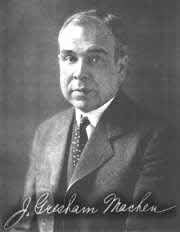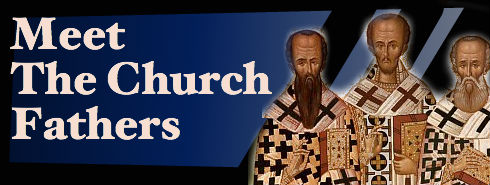 Shortly before he died (January 1, 1937), Dr. J. Gresham Machen sent a final telegram to his friend Professor John Murray. The words of the telegram were these:
Shortly before he died (January 1, 1937), Dr. J. Gresham Machen sent a final telegram to his friend Professor John Murray. The words of the telegram were these:
“I’m so thankful for the active obedience of Christ. No hope without it.”
I’m convinced that in these short words, Dr. Machen was able to express the essence of the biblical Gospel. Let me explain:
Theologians talk of a double function of Christ as our Savior in saving us – His passive and active obedience. The passive obedience refers to His laying His life down for us His sheep. He died an atoning death paying the full penalty for sins. Yet, what is often missed is the function of His 33 years of life on earth perfectly fulfilling all the demands of the law. This righteousness, one that has fulfilled the entire law of God is what is credited to our account as believers in Christ. Christ is our righteousness!
CHRIST DIED FOR OUR SINS, AND LIVED FOR OUR RIGHTEOUSNESS
The Lord Jesus Christ not only died an atoning death for our sins, but before He ever went to the cross, He lived a sinless life that perfectly fulfilled the righteous standards of the law. If all that was necessary for our justification was the death of Jesus on the cross, He could have come down to earth on a parachute on Good Friday, died on the cross for us, and three days later, risen again. But we all know that this is not what happened. Why? Because that would never have been enough.
The good news of the Gospel is certainly that Christ died for our sins.. but it also includes the fact that He lived for our righteousness. For more than 33 years, Christ was tempted in every way like us, yet He was without sin (Heb. 4:15). Christ is the only One who can say that He loved His Father perfectly in life, with all His heart, soul, mind and strength.”
At the cross then, all our sins were laid on Him (though of course, He remained the holy and spotless Lamb of God, in and of Himself) and as our sin bearer, He was punished in our place. As the angel declared to Joseph in Matthew 1:21, “you shall call His name Jesus, for He will save His people from their sins.”
“He Himself bore our sins in His body on the tree” (1 Pet. 2:24).
Isa 53:5, 6 says, “But He was pierced through for our transgressions, He was crushed for our iniquities; the chastening for our well-being fell upon Him, and by His scourging we are healed. All of us like sheep have gone astray, each of us has turned to his own way; but the LORD has caused the iniquity of us all to fall on Him.”
DOUBLE IMPUTATION – If Christ had merely paid the penalty for our sins, our debt to God would have been cancelled, and no punishment would be due to us, thank God! But that is not nearly enough to gain an entry into heaven. That would simply remove the outstanding debt we owed to God and bring us to zero… and zero is simply not enough. Jesus said, “Unless your righteousness (positive) exceeds that of the scribes and Pharisees you shall in no way enter the kingdom of God.” (Matt. 5:20)
We as sinners not only need the removal of the negative (our sin) but the presence of the positive… full and complete righteousness to be able to stand before a holy God just in His sight. So not only were our sins imputed to Christ and He bore their full punishment for us on the cross, but positively, the righteousness of Christ was imputed to us. The punishment due to us because of our sin came upon Him, and the pleasure of God due to Jesus’ complete obedience to every jot and tittle of the law, came upon us. The very righteousness of Jesus Christ is the righteousness imputed to us by grace alone, through faith in Christ alone. This righteousness is one that has perfectly fulfilled the entire demands of the law of God.
I recently read here of someone who had probed further into Machen’s statement in his telegram I mentioned earlier. He was able to find a radio program Machen did just two weeks before his death where he spoke on the active obedience of Christ. The author summed up what was said in this way, “When Dr. Machen talked about the active obedience of Christ, he was speaking of the entire and thoroughgoing obedience of Christ to the commands, laws, decrees, and ordinances of his heavenly Father. In short, Jesus obeyed the entire law of God in every respect, doing all that God required. As Scripture reminds us, Jesus Christ fulfilled all righteousness, and did everything that his Father had given him to do. Dr. Machen was also quick to point out that Christ’s active obedience to the will of God is inseparable from his passive obedience. Christ’s passive obedience consists of his suffering all the just penalties due to the elect for their sins. He endured all the punishment that we deserved, drinking the cup of God’s judgment down to the dregs – draining it to the last bitter drop. Dr. Machen likewise emphasized that although the active obedience and the passive sufferings can be distinguished from one another, they must never be separated. They are inextricably interwoven. The cross of Christ, for instance, is simultaneously the ultimate suffering that Christ endured and the greatest act of obedience that he performed. You can’t have one without the other, and should never attempt to separate the two. ”
Here’s an actual quote from Machen’s radio program, “If Christ had merely paid the penalty of sin for us and had done nothing more we should be at best back in the situation in which Adam found himself where God placed him under the covenant of works. In other words, if Christ only paid the penalty for our sins through his passive sufferings, then we are merely transported back to the Garden of Eden.”
Dr. Machen went on to develop his point:
“That covenant of works was a probation. If Adam kept the law of God for a certain period, he was to have eternal life. If he disobeyed he was to have death. Well, he disobeyed and the penalty of death was inflicted on him and his posterity. Then Christ by His death on the cross paid that penalty for those whom God had chosen.
Well and good. But if that were all that Christ did for us, do you not see that we should be back in just the situation in which Adam was before he sinned? The penalty of his sinning would have been removed from us because it had all been paid by Christ. But for the future the attainment of eternal life would have been dependent upon our perfect obedience to the law of God. We should simply have been back in the probation again.
Here we begin to understand why Jesus’ passive obedience is not enough – if divorced from his active obedience. The passive sufferings of Christ discharged the enormous debt we owe, due to our sins and the sin of Adam. In effect, Jesus’ passive obedience alone would bring our account from hopelessly overdrawn back to a zero balance – our debt would be retired. But having our debt retired and our sins forgiven does not get us into heaven; it simply returns us to the starting point. More must be done if we are to gain heaven. Righteousness must be completely fulfilled, either by us or by a representative acting on our behalf.”
“Moreover, we should have been back in that probation in a very much less hopeful way than that in which Adam was originally placed in it. Everything was in Adam’s favour when he was placed in the probation. He had been created in knowledge, righteousness and holiness. He had been created positively good. Yet despite all that, he fell. How much more likely would we be to fall – nay, how certain to fall – if all that Christ had done for us were merely to remove from us the guilt of past sin, leaving it then to our own efforts to win the reward which God has pronounced upon perfect obedience.”
So although we would have been transported back to Eden again, the effects of the Fall would not have been entirely reversed. We would have been put into a probationary situation with far worse prospects than Adam faced. And if Adam, endowed with original righteousness, holiness, and knowledge, was liable to fall, how much more certainly would we fail the test. Therefore, to possess only Jesus’ passive sufferings leads to a rather hopeless scenario: we’re reassigned to take a test that we are guaranteed to fail. We will never get to heaven if we are forced to rely on our own active obedience to God’s righteous demands.
On the other hand, if Jesus passively suffered for our sins and actively obeyed all of God’s righteous requirements on our behalf, then heaven is absolutely guaranteed to us. And this is why Dr. Machen’s understanding of the complete obedience of Christ – especially his active obedience – filled him with such joyful confidence.
He continued:
“That is the reason why those who have been saved by the Lord Jesus Christ are in a far more blessed condition than was Adam before he fell. Adam before he fell was righteous in the sight of God, but he was still under the possibility of becoming unrighteous. Those who have been saved by the Lord Jesus Christ not only are righteous in the sight of God but they are beyond the possibility of becoming unrighteous. In their case, the probation is over. It is not over because they have stood it successfully. It is not over because they have themselves earned the reward of assured blessedness which God promised on condition of perfect obedience. But it is over because Christ has stood it for them; it is over because Christ has merited for them the reward by His perfect obedience to God’s law.”
The commentator went on to say, “Do you see? Christ has passed the test. He has earned the reward. Heaven has been secured by his perfect obedience to God’s law. And he did not do all this for himself as if he needed to earn heaven for himself. He did all this for his people – even for you, O believer! On your behalf, he actively obeyed, thereby saving you and placing you beyond the possibility of ever becoming unrighteous again. Your status is secured eternally – what a great hope!” So when you comprehend the full obedience of Jesus Christ – both active and passive – you understand why Dr. Machen had such great hope as he lay upon his deathbed. In his own words, “How gloriously complete is the salvation wrought for us by Christ! Christ paid the penalty, and He merited the reward. Those are the two great things that He has done for us.” No hope without it! Complete hope with it!”
 Amen! The work of Christ is perfect in every respect, and perfect in every aspect. The righteousness now enjoyed by the believer is an alien one (one that comes from outside of himself) for it is the righteousness of Christ Himself. It comes to us as a gift, not something earned (Rom. 5:17), and is the cause of our rejoicing in the direct presence of the Lord. “For He (God) made Him (Jesus) who knew no sin, to become sin for us, that we might be made the righteousness of God in Him.” 2 Cor. 5:21. As believers in Christ, we’ve been made righteous with a righteousness that has never known sin, and has fully complied with all the righteous demands of the law. Hallelujah! What a Savior!
Amen! The work of Christ is perfect in every respect, and perfect in every aspect. The righteousness now enjoyed by the believer is an alien one (one that comes from outside of himself) for it is the righteousness of Christ Himself. It comes to us as a gift, not something earned (Rom. 5:17), and is the cause of our rejoicing in the direct presence of the Lord. “For He (God) made Him (Jesus) who knew no sin, to become sin for us, that we might be made the righteousness of God in Him.” 2 Cor. 5:21. As believers in Christ, we’ve been made righteous with a righteousness that has never known sin, and has fully complied with all the righteous demands of the law. Hallelujah! What a Savior!
 “To get at the nature of that faith, or some other virtuous disposition? Here’s the way J. Gresham Machen answers this question in his 1925 book What Is Faith? ‘The true reason why faith is given such an exclusive place by the New Testament, so far as the attainment of salvation is concerned, over against love and over against everything else in man is that faith means receiving something, not doing something or even being something. To say, therefore, that our faith saves us means that we do not save ourselves even in slightest measure, but that God saves us.’
“To get at the nature of that faith, or some other virtuous disposition? Here’s the way J. Gresham Machen answers this question in his 1925 book What Is Faith? ‘The true reason why faith is given such an exclusive place by the New Testament, so far as the attainment of salvation is concerned, over against love and over against everything else in man is that faith means receiving something, not doing something or even being something. To say, therefore, that our faith saves us means that we do not save ourselves even in slightest measure, but that God saves us.’
 Shortly before he died (January 1, 1937), Dr. J. Gresham Machen sent a final telegram to his friend Professor John Murray. The words of the telegram were these:
Shortly before he died (January 1, 1937), Dr. J. Gresham Machen sent a final telegram to his friend Professor John Murray. The words of the telegram were these: Amen! The work of Christ is perfect in every respect, and perfect in every aspect. The righteousness now enjoyed by the believer is an alien one (one that comes from outside of himself) for it is the righteousness of Christ Himself. It comes to us as a gift, not something earned (Rom. 5:17), and is the cause of our rejoicing in the direct presence of the Lord. “For He (God) made Him (Jesus) who knew no sin, to become sin for us, that we might be made the righteousness of God in Him.” 2 Cor. 5:21. As believers in Christ, we’ve been made righteous with a righteousness that has never known sin, and has fully complied with all the righteous demands of the law. Hallelujah! What a Savior!
Amen! The work of Christ is perfect in every respect, and perfect in every aspect. The righteousness now enjoyed by the believer is an alien one (one that comes from outside of himself) for it is the righteousness of Christ Himself. It comes to us as a gift, not something earned (Rom. 5:17), and is the cause of our rejoicing in the direct presence of the Lord. “For He (God) made Him (Jesus) who knew no sin, to become sin for us, that we might be made the righteousness of God in Him.” 2 Cor. 5:21. As believers in Christ, we’ve been made righteous with a righteousness that has never known sin, and has fully complied with all the righteous demands of the law. Hallelujah! What a Savior!